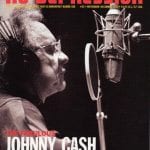Rex Hobart – The man in the mirror
There are fans of the mid-’90s Kansas City avant-garde math-rock band Giant’s Chair who remember its guitar player and leader Scott Hobart driving around town in a statement-making “art car” — a ’67 Plymouth Belvedere with its hood covered in little shattered mirrors, and a gas tank that sat on the front seat. It was a little something he’d traded for in high school.
In 1997, this same Scott Hobart would change his name to Rex, after his father — a man who, from time to time, would take off to play a little country guitar or Sam the Sham at a local bar when arguments broke out at home. The freshly renamed son went on to form a neo-honky-tonk band called Rex Hobart & the Misery Boys. They have only recently acquired a vehicle of their own. A really big mirror-covered “art van,” perhaps?
“Naw,” Rex laughs. “It’s just a little yellow school bus.”
Which would have been an excellent mode of transportation for the road Hobart and his band have taken in the past five years — from an act local admirers would describe as “fun” but also “a drunken lark” and “almost a joke,” to the increasingly seasoned and comfortable honky-tonk band displayed on their third CD, Your Favorite Fool (released September 24 on Bloodshot Records).
Hobart is frank enough about the style of the band’s earliest efforts. “When we started, it was like, ‘Well yeah, we want to play country, play straight up honky-tonk music — but we’d better look good, because we don’t know how the hell to play it.’ Maybe we never looked all that good either!”
Initially, the emphasis for the Misery Boys was on image, in the tradition of the mirror shards on that Plymouth. The band had a sort of working motto that “performance was paramount” — but that didn’t necessarily refer to mastering the rhythms and subtleties of a Ray Price shuffle.
Phil Wilder, of Kansas City old-timey band the Wilders, was around for some of those early shows, and recalls the live effect: “At first, Rex was kind of playing a gag on everybody. He’d have the Misery Boys start playing and at the right moment he would appear from out of the bathroom or from outside the bar, with a bouquet, and run around the audience picking out the lovely ladies and handing them roses. It was cheeky performance-art stuff, very tongue in cheek.”
In addition to his interest in “setting up a spectacular live experience,” Hobart also built (and posted on the internet) an elaborate, semi-satirical and mythological story of the band’s supposed background. Such shtick is almost standard operating procedure for the sorts of twang-rock bands bent on satirizing country music and the cliches of alleged farm behavior. So why all the jokes?
“It was fun — and I wanted to see if people would believe it,” he says. “I don’t know if that’s scary or not, but I’d started billing myself as Rex Hobart, so there was already that facade. I was tired of being in rock bands that took themselves too seriously, and this was having a party every night.”
Giant’s Chair had been pretty successful in that “serious” rock world; they’d had two albums, toured both coasts, and, in the ways of math-rock, had tried a mind-boggling array of Hobart’s erratic start/stop rhythms along with his more cerebral song ideas. If swerving to form a working honky-tonk band seemed an erratic rhythm reversal itself, it was not entirely as a “lark,” drunken or sober, that Hobart made the move.
“We were on the road, and seeing people trying to make ‘serious’ music they thought was original — and it came to seem to be a lot of bullshit. Maybe it’s an arrogant point, but I got there. And I’d pushed this complex sort of rock as far as I could push it. I wanted, instead, to minimize, to the Nth degree. So I decided to write songs in major chords that anybody could play.”
That mood brought to mind the country music that had filled his house growing up in Southern Missouri — and which, like so many others of his generation, he’d rebelled against and run from in the first place.
Hobart’s grandmother had, in fact, played lap steel and piano, his father had that ongoing amateur interest in picking, and his mother wrote country songs. Mom is the “Elinor Jody Hobart” credited with the original and witty hard country number “Mother Of A Member Of The Band” on the first Misery Boys album; it’s one of 30-some numbers she was writing when her son was 15, as he was borrowing her guitar to learn to play his first chords. Elinor’s proclivity for honky-tonk humor and turns of phrase would turn out to be her son’s notable initial strength as well.
The wordplay and twists and song ideas that would surface in Misery Boys songs such songs as “I’ll Forget Her Or Die Crying” and “I Walked In While He Was Changing Your Mind” were evident in the first twang compositions Hobart started to sing in Kansas City bars. The lyrics were a key attraction both for members of the local band Sandoval, three of whom would soon become Misery Boys, and (two years later, in 1999) for Bloodshot honcho Rob Miller, who signed the band on the strength of the songwriting.




